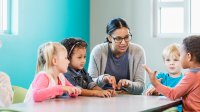Tips for Easing Children Into Kindergarten
With the loss of preschool time over the past year, many kids starting kindergarten will benefit from a focus on executive function skills.
Your content has been saved!
Go to My Saved Content.Covid-19 forced the closure of many schools around the country. In addition to lost time playing, being with friends, and learning, children in pre-K also lost the instruction they usually receive that prepares them for kindergarten. Expectations may vary from one kindergarten class to another, but in general, kindergarten is very different from preschool, even in this pandemic age.
There are longer periods of instruction, more academic demands, and less focus on free play. So how can you help children ease into kindergarten? One important thing you can do is teach them executive function skills.
Executive function is a term used to describe a person’s memory skills, flexibility, and ability to regulate their behavior. Young children, in particular, need lots of practice strengthening each of these areas. The good news is that there are many games and easy-to-implement activities you can do with children to help them build these skills.
Strengthen Their Memory Skills
Developing strong memory skills will help children in kindergarten, where they are given more multistep directions (e.g., “In your journal, draw a picture of your favorite part of the story. Then write about it. Don’t forget to write your name on the top of the page.”). Here are some ways to strengthen their memory skills.
Tell tales together: Begin a story and have children repeat what you said, and then add on to it. Then you do the same and keep the pattern going. For example, you can start a story such as “I went to the beach and I saw a shark!” Then one child may say, “I went to the beach and I saw a shark. The shark waved at me.” Remember to keep it playful. Begin another story when the first one gets too long for children to recall.
Play Match Me: Do two movements in a row (clap and jump) and ask children to repeat them. Add more movements if children are able. You can also do this with sounds (say “beep boop”) or clapping patterns (clap two times and pat your lap once).
Retell stories: Children enjoy rereading books. If they have a favorite story, ask them to them retell it from memory. Say, “What happened in the beginning?... Then what happened?... How did the story end?” To support their retelling, turn to specific pages in the book and invite children to refresh their memory.
Introduce Activities That Support Flexibility
Being able to adapt and change your thinking is important in kindergarten, where children may have a more structured schedule and less choice. Help children develop their flexibility in these ways:
Find objects: Collect objects on a nature walk, or use upcycled materials such as paper towel tubes or fabric, and explore their uses. Ask children, for example, what they think a stick could be. How would a doctor use the stick? A farmer? A firefighter? How could we use it in the kitchen? Ask, “What else can it be?” to encourage divergent thinking.
Change the rules: When you invite children to play hopscotch, start from 10 and go backward. Have a Wear Your Shirt Inside Out Day. Any variations to typical routines or rules of a game help children see that flexibility can be surprising and have fun results.
Role-play: When you role-play, you invite children to brainstorm multiple solutions to common problems. Puppets are a natural and engaging method for involving children in role-plays. For example, you can use a puppet to describe a common problem (“Our puppet wants to go to the park, but it’s raining outside”). Children can empathize with the puppet and then offer a variety of solutions, learning that there isn’t just one way to solve a problem.
Model and Teach Self-Regulation
Self-regulation, or the ability to control your behavior, is not a trait that people are just born with. It is important for children to see this modeled by the adults in their life, be supported in learning how to self-regulate, and be given lots of practice. In kindergarten, there is usually a higher expectation around children’s ability to self-regulate. Here are some strategies you can use to help children develop these skills:
Take turns: Turn-taking is a great way for children to learn self-regulation. For example, if the class is making a snack together, have them take turns stirring or adding ingredients. If you are playing outside, take turns tossing or kicking a ball. Most board games also include a turn-taking element.
Name emotions: Being able to identify and name feelings opens up the door to regulating them. When reading books, for example, talk about the characters in the illustrations. Ask children what they think the character is feeling. Most important, ask them how they know. “Is the character smiling? Frowning? Are their arms crossed?”
Teach positive self-talk: Children can do many things on their own, but sometimes they might feel frustrated if they can’t. Model and teach children how to use self-talk, such as saying, “I can do it.” In this way, they are learning how to build confidence and take care of themselves.
Doing even a few of these things as the school year begins will help children be more prepared for the rigors of kindergarten.
